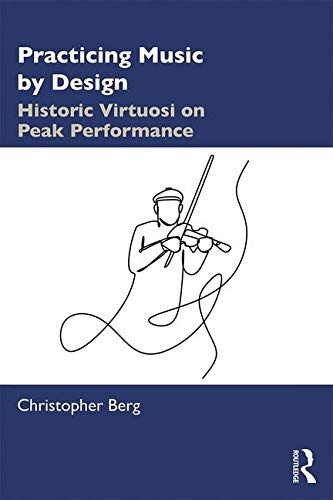Practicing Music by Design: Historic Virtuosi on Peak Performance
Christopher Berg's new book explores pedagogical practices for achieving expert skill in performance. It is an account of the relationship between historic practices and modern research.
Readers of this blog know that I have not been posting regularly. As I stated when I established the blog in 2015, I wanted to have a place where I could post extensively researched writings about whatever interests me. Ghost, my blogging platform, lists increasingly longer reading times for my last five posts: five minutes, eleven, twelve, fourteen, eighteen.
Well, the things that have interested me of late have turned into a book. I am pleased to announce that Routledge, a division of Taylor & Francis, has released my new book, Practicing Music by Design: Historic Virtuosi on Peak Performance. The book is listed on distribution sites all over the world and is shipping now. You can visit the Routledge page for the book, the Amazon page, or search for the title wherever you prefer to buy books. It is available in paperback, hardcover, and as an eBook. If you'd like to get a concise overview of the contents, you can read short abstracts for each chapter on the Taylor & Francis page for the book. These abstracts give a much better sense of what I do in each chapter than I could provide here. (The abstracts are beneath chapter headings under the table of contents.)
This book was not written specifically for an audience of guitarists, and I did not want a guitar on the cover. It is for all musicians aspiring to develop high levels of skill and artistry and teachers of those aspiring to achieve high levels of skill and artistry on their instrument. Although I hope all musicians will find it stimulating and thought-provoking, it is especially relevant for solo performers, and many of the legendary performers I discuss were soloists.

I write in the preface that most books on music practice tend to be instrument-specific and rarely contain research or other corroborating material to support an author’s assertions. Most of these works exist as atomized monologues. The initial idea behind Practicing Music by Design was to help my students understand the reasons behind the practice advice I give them, especially when that advice seems counter-intuitive or is contrary to cherished popular mythologies connected to an admired artist. To that end, it is more of a “why-do” book than it is a “how-to” book.
As I studied modern research on peak performance and high-level skill acquisition, another compelling reason emerged: Although most of the modern neurological, physiological, and psychological research on exceptional performance focuses on athletic skill (there is an occasional mention of high-level musicians), many of the conclusions of these researchers had been articulated in the pedagogical writings of legendary virtuosi as much as a century beforehand. The terminology may be different, but the parallels are unmistakable, and this is what I explore in this book.
